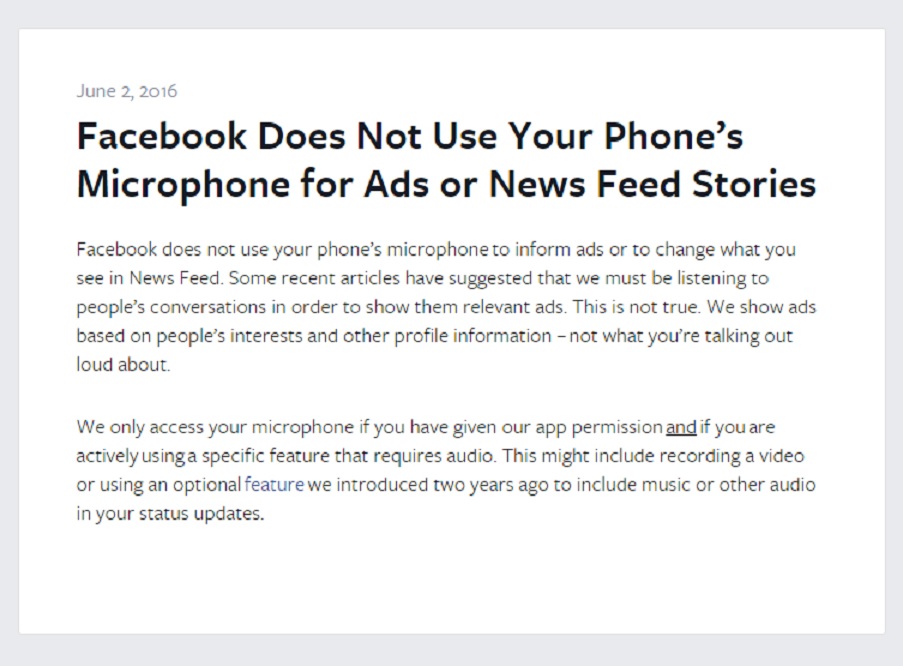
A long-held conspiracy theory – that Facebook is listening in on conversations to target us with adverts – has resurfaced again on social media.
One of Facebook’s executives in charge of adverts responded to a tweet from PJ Vogt, co-host of the internet-focused Reply All podcast, who asked followers to phone in if they believed Facebook had used their phone microphone to spy on them for advertising purposes.
The social media site’s Rob Goldman quickly responded to categorically deny such activity takes place on Facebook’s family of apps, which also includes Instagram.
I run ads product at Facebook. We don't – and have never – used your microphone for ads. Just not true.
— Rob Goldman (@robjective) October 26, 2017
The original theory dates back some time, and is based upon a range of Reddit threads, YouTube videos and social media posts from users who claim to have been shown adverts for products shortly after having conversations about them.
Facebook has spoken out in the past too, posting a statement to its press site in 2016 unequivocally denying it uses the microphone for any kind of listening in for advertising or News Feed story reasons.
“Facebook does not use your phone’s microphone to inform ads or to change what you see in News Feed,” the company said in statement in June 2016 – the last time conspiracy theories swelled.
“Some recent articles have suggested that we must be listening to people’s conversations in order to show them relevant ads. This is not true. We show ads based on people’s interests and other profile information – not what you’re talking out loud about.
“We only access your microphone if you have given our app permission and if you are actively using a specific feature that requires audio. This might include recording a video or using an optional feature we introduced two years ago to include music or other audio in your status updates.”
Think Facebook isn’t listening? Think again. I only had an in-person conversation about buying a bow tie and now this #facebookislistening pic.twitter.com/DmsTLDpY75
— Ryan Northcott (@ryannorthcott) October 29, 2017
The additional feature the social network is referring to is a music recognition tool not available in the UK, where users can choose to turn on the mic when updating their status and have Facebook identify the track they’re listening to and include it as part of the status post.
Many within the tech industry think it is unlikely that Facebook would engage in such behaviour for a range of reasons – but most prominently because of the legal fallout if such a scheme was discovered, the various App Store rules it violates and the PR disaster it would also prompt.
One theory that has been put forward is users could be experiencing what’s known as the Baader-Meinhof phenomenon, also known as the frequency illusion.
The phenomenon is based on the idea that something you’ve heard about recently seems to appear more often in life that ever before.
The idea is that rather than something actually appearing more often, instead you’re simply noticing it more because you’ve engaged with the idea of it.
The crux of this argument is that we all scroll through millions of adverts on Facebook and elsewhere every year, the vast majority of which we pay no notice to, but should one appear that resonates with a recent conversation, it’s likely to catch the attention.
 (Facebook)
(Facebook)
It’s also worth remembering that Facebook and many other tech giants are able to use online activities and habits to target adverts at us – browsing history, Facebook interests and other factors for example.
High-powered and well-designed algorithms that shouldn’t be underestimated are at work here.
For now, it’s being marked as coincidence, but anyone who wants to turn off Facebook’s microphone access – which it asks for when you try to record video in the app – can do so from their phone settings.


Why are you making commenting on The Herald only available to subscribers?
It should have been a safe space for informed debate, somewhere for readers to discuss issues around the biggest stories of the day, but all too often the below the line comments on most websites have become bogged down by off-topic discussions and abuse.
heraldscotland.com is tackling this problem by allowing only subscribers to comment.
We are doing this to improve the experience for our loyal readers and we believe it will reduce the ability of trolls and troublemakers, who occasionally find their way onto our site, to abuse our journalists and readers. We also hope it will help the comments section fulfil its promise as a part of Scotland's conversation with itself.
We are lucky at The Herald. We are read by an informed, educated readership who can add their knowledge and insights to our stories.
That is invaluable.
We are making the subscriber-only change to support our valued readers, who tell us they don't want the site cluttered up with irrelevant comments, untruths and abuse.
In the past, the journalist’s job was to collect and distribute information to the audience. Technology means that readers can shape a discussion. We look forward to hearing from you on heraldscotland.com
Comments & Moderation
Readers’ comments: You are personally liable for the content of any comments you upload to this website, so please act responsibly. We do not pre-moderate or monitor readers’ comments appearing on our websites, but we do post-moderate in response to complaints we receive or otherwise when a potential problem comes to our attention. You can make a complaint by using the ‘report this post’ link . We may then apply our discretion under the user terms to amend or delete comments.
Post moderation is undertaken full-time 9am-6pm on weekdays, and on a part-time basis outwith those hours.
Read the rules here